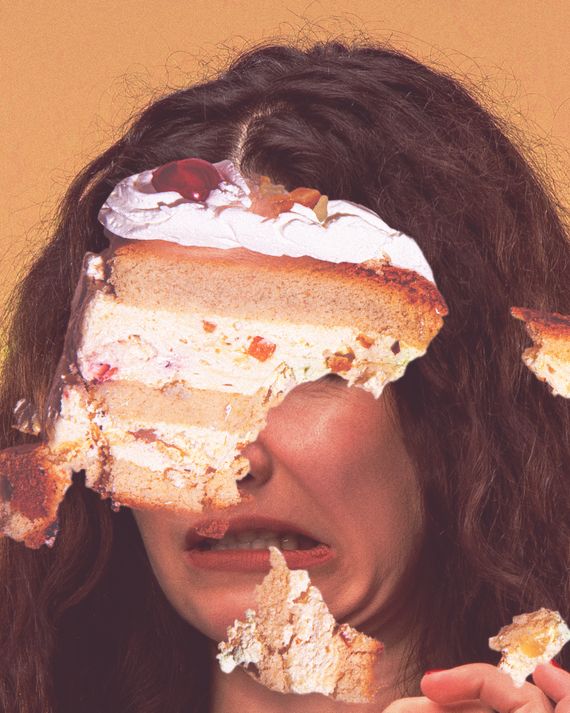
Photo-Illustration: The Cut; Photos: Getty
This article was featured in One Great Story, New York’s reading recommendation newsletter. Sign up here to get it nightly.
Mila didn’t want a wedding. Eloping on a beach would have suited her, but when her boyfriend of six years proposed and insisted on a more formal event, she planned an intimate garden party.
There was one detail she didn’t account for, one logistical crisis she hadn’t foreseen: As Mila and her new husband cut into their raspberry-lemon cake, guests circled around snapping photos and he snatched a handful, shoving his palm from the bottom of her chin to her forehead. In shock, with cake stuck to her eyelashes and up her nose, she tried to back away. He held her by her neck, thrashing another mound into her face. (Her name, like most others in this story, has been changed for privacy.)
“It was humiliating,” she remembers now. “And it hurt. He cracked my nose hard enough I thought I was bleeding.” Mila retreated to the bathroom with friends, where she clawed fondant from her sinuses with her nails. Her dress was ruined, so she changed into spare clothes. She redid her makeup in a mirror over a sink, the look done by a professional that morning now irreparable.
“The worst part was that he was cackling with his buddies. He thought it was hilarious,” she says. He saw it as a prank, but to her it felt disrespectful and violating: “Do you have some kind of aggression toward me? Is this your moment to spill it out onto me?” A little frosting on the cheek wouldn’t have bothered her, but this seemed more about dominance than ritual or tradition. It hadn’t occurred to her that they should discuss cake-cutting boundaries.
When Anna planned her wedding, she did make it clear to her fiancé that she didn’t want a messy cake-smash fiasco. But it didn’t matter. Though they’d agreed to delicately exchange pieces of the two-tiered vanilla-almond cake she’d carefully selected, he went rogue. “He was throwing it at me,” she says. “I wasn’t expecting it at all.” Anna was mortified but pretended to play along. He grabbed her arms and restrained her, pummeling cake into her face and hair and all over her dress. “I really thought about leaving. I didn’t want to be there anymore,” she says.
When she returned from a tearful trip to the bathroom, where bridesmaids dabbed her dress with wet paper towels, she found her husband drinking Champagne. He didn’t seem to realize she was upset. For the rest of the reception, she kept her distance from him, dancing with friends in a stained white gown. “I knew my night was ruined, but I didn’t want everybody else to know,” she says. “In my head, I was thinking, We are going to be together forever. But I’m not going to be happy.”
Cake rituals are nothing new; back in ancient Rome, the groom would sprinkle barley crumbs over the bride’s head, symbolizing dominance and the hope of future fertility. Over time, this evolved into feeding each other, a gesture intended to show reciprocal care, with some couples making the event more playful by patting icing on each other’s faces.
But in the past few years, viral “cake smashing” videos, in which one-half of the couple, usually the groom, enthusiastically hammers wedding cake into his bride’s face, have become a popular form of rage-inducing content. Searching “wedding cake smash” on TikTok and Instagram turns up countless videos, many with millions of views. Some couples mutually enjoy and even plan such an event, but what goes viral — the kind of thing prompting thousands of Reddit comments — are one-sided attacks. In one widely shared video, the groom chases the bride into a corner of the venue as she begs him not to smash cake on her. He knocks her to the ground, smears cake on her dress, then walks away smiling as a guest approaches with napkins. In another, the bride smushes cake on the groom with her fingertips. He retaliates by picking up the entire cake, using two hands, and hitting her in the head with it, sending her stumbling into a table.
In scenarios not involving wedding cake, pushing a spouse to the floor and striking them with an object or restraining them against their will would be called another word. Sometimes, the injuries are severe.
Fiona Battersby, a Nashville wedding photographer, recalls one particularly disturbing cake smash, where the bride had to run to the bathroom because her face was covered in blood. “The family was really upset, and the entire crowd of people knew something was wrong,” she says. Battersby suspects the bride’s nose was broken. The bride’s parents sent the photographers home.
Elena was 19 and eight-and-a-half months pregnant when she got married at a courthouse. She had always felt unwelcome with the family of her fiancé, who was 30, which she attributes to social status — she grew up poor, she says, and they were wealthy. At an Olive Garden after the legal proceedings, her new husband’s father whispered something in his ear. Suddenly, cake was in her eyes and she couldn’t see: “Everyone in the restaurant was watching. I had to run to the bathroom because I didn’t want to sob in front of them.” Now divorced, she says it’s a memory that still bothers her. “It’s not just about the cake,” she says. “A good partner doesn’t take a special moment and make you look stupid.”
Online, everyone seems to have a strong opinion about cake smashes. To some, it’s sweetly mischievous, and to others, it’s belligerent. One prevailing theory is that husbands who are destructive with cake — to the point that it causes embarrassment or, worse, physical injury — are likely violent at home too. Is cake smashing an indicator of abuse?
“It’s on the continuum,” says clinical psychologist Michael Brustein. “On the low end, perhaps. But there’s some smoke there.” He says this behavior might reflect an unconscious fear that marriage leads to a loss of self. “It’s a way of saying, ‘I’m not controlled. I just did this whole act of submission, getting on my knees. Please marry me. Please love me.’ There’s pleasure in saying, ‘I’m still a man and I’m still dominant.’”
For some brides, fully understanding the seriousness of the incident takes time. When Anna’s husband smashed their wedding cake, she didn’t think of it as violent. “I was just embarrassed and trying to convince myself that it wasn’t anything to be alarmed by,” she says. “But I should never have had my arms restrained by my husband, especially when he knew, without a doubt, that I did not want that.” She can see now that the cake incident lined up with past behavior — he’d been jealous and possessive before: “That wasn’t the first red flag. It was just the most major red flag, because it was in front of everybody.”
Of course, not all grooms who smash their wedding cakes do so out of a desire to injure their wives or assert power. But if they aren’t acting out of simmering contempt, then why do they do it?
Every wedding Jason had ever attended featured some component of cake smashing. When he got married, he assumed he should smash cake, too, and that it would be mutual. Guests applauded, but when he got cake in his wife’s eye, she was angry. “I did not see that coming or I wouldn’t have done it,” he says. “Weddings are deeply personal and unique, but at the same time, they’re about being part of the chain of life and doing what your ancestors did or what your community does. I thought this was a thing everyone does.”
Before their wedding, Liam’s wife reluctantly agreed to let him get cake on her because he’d wanted to do it so badly — he wanted their wedding to be lighthearted and celebratory, and cake smashing seemed good for a laugh. “She wasn’t keen on it, because she didn’t want to ruin her dress. Spoiler alert: It did slightly ruin her dress,” he says.
If his wife had protested on ideological grounds or expressed “a horrific fear of having cake on her face, or some real, legitimate reason,” he would have skipped it, he says. He didn’t want to embarrass her. “She got to choose basically the whole wedding. I wanted very little, and this is one of the things I wanted,” he says. “Weddings aren’t just for the bride. Grooms should get to have a preference here and there. I was pretty adamant, like, No, we are doing the cake thing.”
When Kaylee posted a video of her rowdy cake smash, she didn’t anticipate so many strangers seeing it, and certainly not that thousands would leave comments accusing her husband of domestic violence. In the video, he overpowers her as she falls to the floor, trying to retaliate with her own fistful of cake while he restrains her arms and traps her with his legs. He’s laughing, she doesn’t appear to be, and their guests whistle and cheer. Other TikTok users made their own content out of her video, saying the bride was victimized.
Kaylee insists it’s a memory she cherishes. “I smile about it all the time. If you know me, it’s classic Kaylee,” she says, explaining that the idea came from a friend who suggested a contest to recoup costs: Guests put cash into jars to vote on which member of the couple they wanted to see smashed with cake. As the jars filled, she could see the vote wasn’t in her favor. “Oh, it was intense. It was aggressive,” she says. But she promises it was mutually entertaining. “My husband is a really good man. They don’t make men like him anymore.”
The physical struggle didn’t hurt her, she says, but the comments she received online sure did. She was afraid the police would show up for a wellness check. She deleted the original video, then reposted it with a caption defending what happened: “Our cake was not by any means normal for society, but it’s normal for us.”
In the months after Anna’s wedding, she repeatedly asked her husband why he went against her wishes when she’d been so clear about not wanting the cake smashed. He avoided the question for a long time, seemingly unable to come up with an explanation. Sometimes, Anna says, it was as if he never thought about it again or forgot he’d done it at all. To her, it was the beginning of the end; they divorced within a year.
Eventually, just before they split up, Anna’s husband mustered an answer. “I don’t know,” he said. “I thought it would be funny.”


